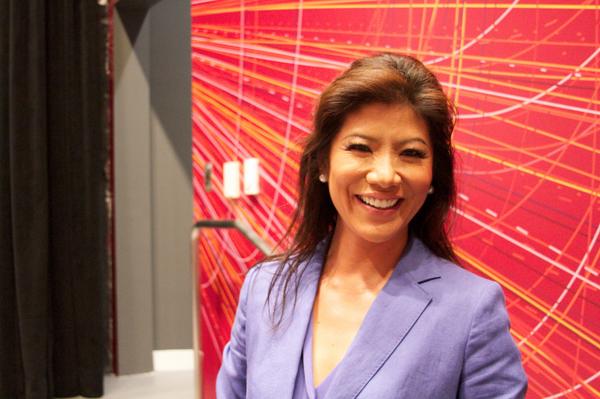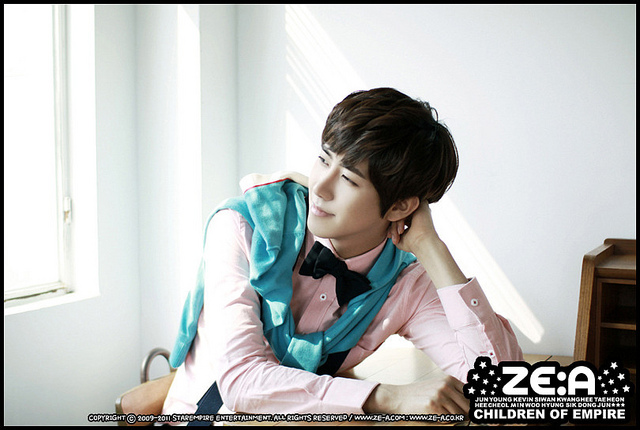Asian-American Cosmetic Surgery: Not As Much Of A Race Issue As You Might Think

In a field where few women and even fewer women of color are in the limelight, talk show host, anchor and producer Julie Chen stands out. She may be recognized for being Chinese and, perhaps, for being married to the President and CEO of CBS, but lately she’s been making the news for another reason: her eyes.
The Talk and Big Brother host announced late last year that she underwent double eyelid surgery, known as the Asian blepharoplasty, due to professional pressure; a former boss had told Chen that she would never be an anchor because she was Chinese, and a big-time agent refused to represent her unless she got plastic surgery to make her eyes look bigger.
“And I did it,” she said on The Talk. “After I had that done, the ball did roll for me.”
Chen received backlash for this revelation. News outlets and social media users identified this as a race issue, stating that Ms. Chen was striving to look more Westernized by “Americanizing” her face.
One derisive tweet read: TY @JulieChen, you are a hero. Teaching all Asian girls: if a white man says you are too Asian, just become less Asian. #STRAIGHTTOTHETOP!
Julie Chen was shocked at the controversy this stirred and stated that she doesn't look any less Chinese.
While the issue of plastic surgery and its acceptability is contentious, a Korean-American plastic surgery recipient, two L.A. plastic surgeons of Asian descent and a Korean-American University of Southern California student, do not believe Chen’s surgery had much to do with race.
SEE ALSO: 'Big Brother' Host Julie Chen Gives Advice To USC Students
“I’m 43 but I look 34. I tell people I’m dyslexic. Oh, I’m 34,” Kim jokes.
She began looking into the procedure about two years ago, going to various consultations and thoroughly researching her options.
“I just took my time,” she says. “It wasn’t something where I made a rash decision. I think it’s a thing of: it’s your body. You want to make sure you do your due diligence.”
She went to eight different consultations with doctors, primarily in Beverly Hills, many of whom are Korean plastic surgeons.
“I think if you’re Asian, you have a subtle connection with an Asian doctor because you feel like he/she knows your body,” Kim explains.
Kim eventually scheduled the operation with Beverly Hills Surgeon Dr. Eugene Kim. She described him as the perfect fit for what she envisioned for herself.
“He wasn’t someone who disregarded what I wanted. I was like, I don’t want to have big boobs. I want to feel comfortable in my clothes. I’m petite. I do not want these huge breasts,” she says. “He got it. He wasn’t saying, 'Oh, you should go big. You have a great body.' He listened.”
Kim reiterated time and time again that she did the procedure for herself and it was something she thought about carefully.
SEE ALSO: 'Do My Boobs Make Me Look Slutty?' And Other Busty Girl Problems
“The reason I got my breast augmentation was for me. There was no pressure. I did it absolutely because it’s something that made me happy,” she explains. “Once I had it done, I realized how much more confident I was. I love my body. I’m proud of my body. It’s not like I’m out there exposing it, but I just feel comfortable.”
Kim is aware of Julie Chen’s career and blepharoplasty. She believes that Chen should only have gotten her eyes done if she wanted to do it for personal reasons. Kim says she thinks it’s unfortunate that Chen caved to outside pressure from higher-ups, but she knows that that pressure exists.
“In the business of entertainment and when you’re in the public eye, there’s pressure to look good no matter what,” she notes. “[Chen] chose to be a news reporter. People are always criticized. You better have thick skin and be used to rejection and being criticized if that’s the field you’re going to go into.”
She claims that if she were in Chen’s position, she wouldn’t have had the procedure.
“We’re entertaining the thought that she caved into plastic surgery because there was this pressure from the people she worked with saying, 'You don’t have the right look.' So in that case, I would have told them, 'Screw you,'” Kim says.
SEE ALSO: E! Program Irresponsibly Promotes Plastic Surgery
Kim says she would have had a lot more respect for Chen if she said, “You know, they suggested it and I was actually thinking about it for myself.” In that case, she would think of Chen as a strong woman.
“But I think for her to say, 'Oh, they made me do it' or 'They told me to do it…' It makes me think a little bit less of her and it makes me think very critically of the people she worked with,” Kim says.
As far as her own surgery, Kim notes that she didn’t get the breast augmentation so she could be more “white girl.” She says her aspiration was not to look like a Caucasian woman, but to feel well proportioned.
“My girlfriends got their eyelids done because it brightens up their face. It makes them look younger. It’s a non-invasive, very simple surgery,” says Kim. “I don’t think it’s Westernizing at all. I think people are proud to be Asian. It’s not trying to look Caucasian. They just want to look prettier.”
SEE ALSO: Westernization: A Women's Rights Paradox

“As plastic surgeons, we've researched what people find the most aesthetically pleasing and we use surgery to achieve this ideal; however, I believe it's really important to maintain your ethnicity,” he explains. “I tell patients that I am not trying to change your appearance—just enhance what you already have. In my opinion, maintaining a natural look is the best possible outcome.”
Eugene says that he sees patients of all different ethnicities, not just Asian-Americans. He reveals that statistics from the American Board of Plastic Surgery show the most amount of plastic surgery is performed in the West Coast.
“Los Angeles is driven by the entertainment industry, which really plays a large factor in the popularity of cosmetic procedures in L.A. The warm weather all year round is another factor. For these reasons, Angelinos tend to be very image-conscious,” he says.
SEE ALSO: Lady Gaga's Body Revolution Encourages Positivity
Dr. William P. Chen specializes in double eyelid surgery in L.A. and is the Founder and Medical Director of the Asian Eyelid Surgery Center. On his website, he states that individuals may elect to get the procedure done in order “to apply make-up without smudging, to save time, to correct asymmetry, to create consistency and constancy, or to fulfill their correct impression that having a crease that simulates a natural crease makes the eye more attractive.”
Chen states that the reason Asians likes to have an upper lid crease is because the eye opening will look bigger after undergoing double eyelid surgery, even if the procedure may not have involved lifting the muscle of the upper lid to a level higher than before.
However, patients typically want an Asian crease "shape,” and they are not attempting to jump ethnic categories. He touts that these individuals are not striving to look more European, but instead enhance their existing eye structures.
“This is the most common stereotypic view, often from native Asian-Americans doing literature search, or trying to take a position [that] this is a Westernizing/Occidentalizing trend,” he states. “I think people on the sidelines overanalyze. This is a very common procedure in Asia.”
READ MORE: 7 Misrepresentations of Women in Media

“As a Korean, it’s very prevalent and widespread in our culture, so I know a lot of people have gotten double eyelid surgery—which is considered plastic surgery [in America]—but in Korea, everyone does it so it’s not even considered that anymore,” she says.
Lee believes that it’s more stigmatized to get plastic surgery in American than it is in Asia. She notes that in Korea, “everyone does it” and you commonly see people who have undergone plastic surgery just walking down the street.
It is not uncommon or frowned upon for someone to get a nose job or double eyelid surgery. Here, however, Lee claims that it’s not as prevalent and that people try to hide it.
“I know in the K-pop industry, most idols are forced to get procedure,” she says. She mentions one of her favorite K-pop artists, Kwanghee, and how he has had many cosmetic operations.
“He’s so upfront and sassy about his plastic surgery and that’s why he’s popular,” Lee states.
SEE ALSO: L.A. Korean Festival Celebrates The Best Of Korean Culture
Lee does believe, however, that in Korea plastic surgery has something to do with achieving Western standards. Everyone wants big eyes and a slim face.
“It’s different because here, Americans have a different perspective of what Asian beauty should look like,” she notes. “They look at slanted eyes and typical Asian characteristics [as appealing]. But in Asia, they look for more Western features like light-colored hair and light skin.”
“For an anchor like Julie Chen, her eyes aren’t what make her a person. It’s what she says and how she conducts herself on air. Honestly, my opinion is that I feel that she wimped out," says Lee. "Don’t do plastic surgery because someone else thinks you need it.”
Lee expresses that she believes Chen should have held her ground, as a role model for many Asian-American girls. She thinks Chen should not have gone through with the procedure, because she claims she caved to the pressure.
“It’s debatable, because how would that have affected her career if she hadn’t gotten that procedure?”
Lee’s stance on plastic surgery in general is also mixed. She thinks it would be ideal if people just loved themselves for who they are but says that if there is something about a person that he/she just can’t get over, and that person feels he/she could live a much happier life after cosmetic surgery, then why not?
“But it’s something that one should take a lot of time to think about instead of doing on impulse.”
Reach Web Producer Belinda Cai here and follow her on Twitter here.



